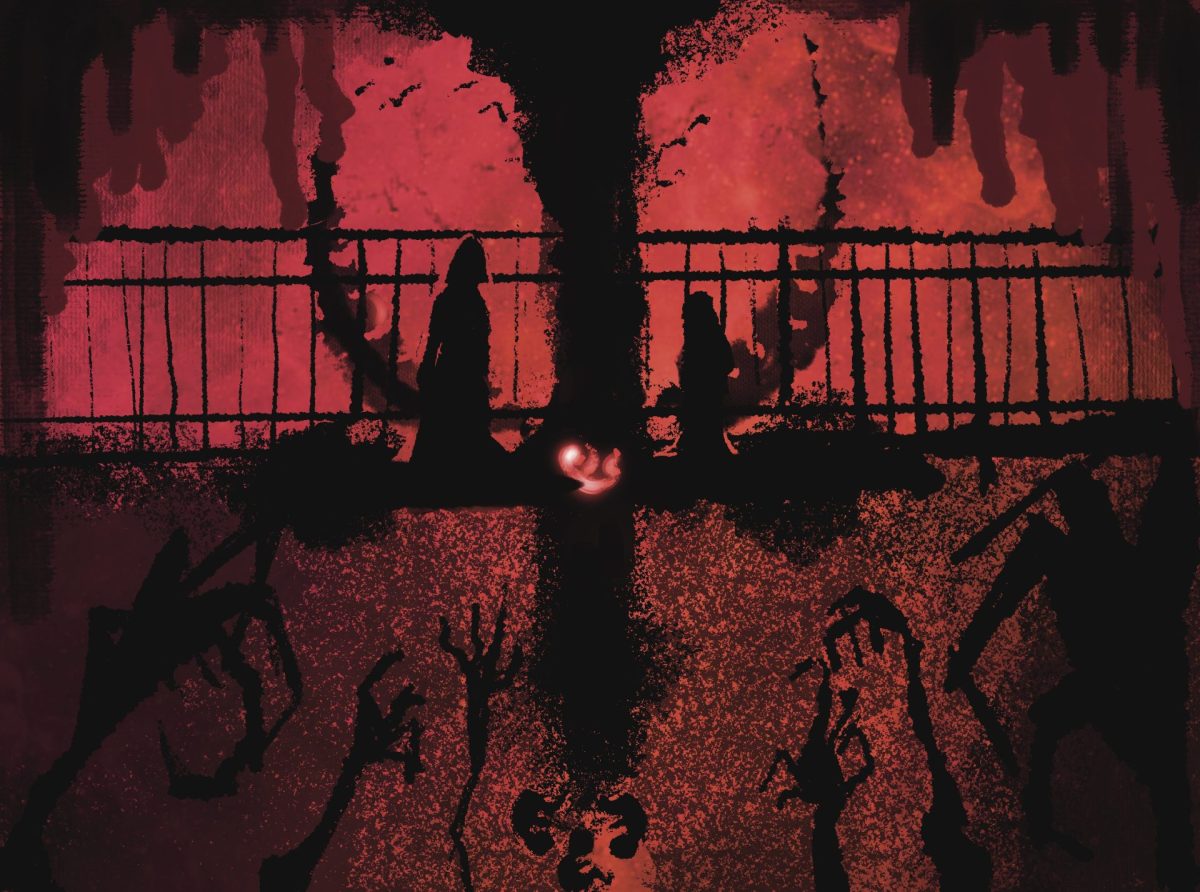This winter, the DePaul Theatre School has a show that transcends entertainment and becomes an experience. “Angels in America, Part Two: Perestroika,” written by Tony Kushner and directed by Jane Drake Brody, is the second installment of a brave two-part show. It is lengthy, intense and severe, but those who are willing to brave it will leave pleased and gratified.
“Angels in America” tells a winding and complex tale that is grounded in the relationship between four individuals. Joe and Harper Pitt are a young Mormon couple who are torn apart when Joe discovers he is gay and leaves his wife. He seeks refuge and love from another man named Louis, who is the ex-lover of Prior Walter, a man infected with AIDS. The play begins when an angel comes down through the roof of Prior’s bedroom and leaves him with a vision that convinces him that he is a prophet.
The tale is infused with multiple components and winding story lines, though there is some grounding force within it that never leaves the audience behind. It serves as a striking commentary on the tragic AIDS epidemic and the incredible intricacies of humanity as a whole.
“‘Perestroika’ is a complicated, passionate and moving piece,” said Andrea Tichy, a manager of public relations and special events at the Theatre School. “At The Theatre School, it engages our student company – in design, stage management, dramaturgy, acting and all theater arts involved with this production – to bring their great work to the Merle Reskin Theatre stage, in order to restate and reignite the message of hope that exists at the core of this play.”
This season’s show pays true homage to the talent within the famous Theatre School. The performances presented within this show are absolutely impressive. The text of the play itself is wonderfully poetic and unimaginably tricky, but the cast manages to breathe both life and clarity into it.
Though each member of the small nine-person ensemble is outstanding, Jack Ball shines as Prior Walter. He graced the stage as the young Melchior in this fall’s “Spring Awakening” and brings a whole new level of vigor to his performance this winter. Prior is an intricate individual that could easily be dismissed as over-the-top or unbelievable. The honesty, humor and earnestness with which Ball portrays him, though, create a character that is perfectly lovable and convincing. Ball has the ability to hit the highest highs and the lowest lows in the most natural way. He is both intense and subtle and his duality drives the show and engages the audience.
Another standout performance can be found in DePaul Theatre School actor Rejinal Simon. While he portrays several small characters throughout the show, as many of the actors do, he takes on the role of Belize, the nurse who cares for many of the men with AIDS. Simon’s performance brings so much warm energy to a production that can be incredibly bleak at times. His appearance is always renewing, and behind every line and every action is an unparalleled level of heart and dedication. His vivacity restores the audience for the show’s inherent intensity that only builds over time.
David Gianni portrays Roy Cohn, the historically famous lawyer who comprises one of the intricate side stories within the production. Cohn is slowly passing away from AIDS, and within the play he is only ever seen in a bed that rises occasionally from the stage. The ghost of Ethel Rosenberg, whom he sentenced to death, perpetually haunts him. Though Gianni was limited physically, his performance was mesmerizing. His character was detestable, though his commitment to his portrayal was so striking that it is hard to draw your eyes away.
The scene design in this production, by Tierra G. Novy, is nearly flawless. It is both beautiful and essential in the telling of an often times convoluted tale. It is comprised mainly of metal-like pillars that loom in the background. The set as a whole strikes just the right balance of bleak, warm and unequivocally innovative. It manages to impress, but never overwhelm. It illuminates perfectly the series of outstanding performances that makes this play what it is.
The fact that this production is the second installment of a two-part series leads to some inevitable initial confusion. A brief synopsis of the first installment, “Angels in America, Part One: Millennium Approaches,” is available in the Playbill, and reading it is essential to an immediate enjoyment of the current production.
“Angels in America” is a triumph of both literary and theatrical work. It is the kind of show that could easily hang too loose on a cast that cannot handle its intricacies, but the production comes alive at the Merle Reskin. The cast evokes an innate understanding of the most complex and the most subtle human commentaries within this show. It is a lengthy commitment, but those who are willing to put in the time will be sincerely moved.
This winter’s show is not a kind that can be easily forgotten. It will remain with its audience and continue to haunt them long after they have left the theater.
Angels in America, Part Two: Perestroika will run through Feb. 17, 2013.





![DePaul sophomore Greta Atilano helps a young Pretty Cool Ice Cream customer pick out an ice cream flavor on Friday, April 19, 2024. Its the perfect job for a college student,” Atilano said. “I started working here my freshman year. I always try to work for small businesses [and] putting back into the community. Of course, interacting with kids is a lot of fun too.](https://depauliaonline.com/wp-content/uploads/2024/04/ONLINE_1-IceCream-1200x800.jpg)

